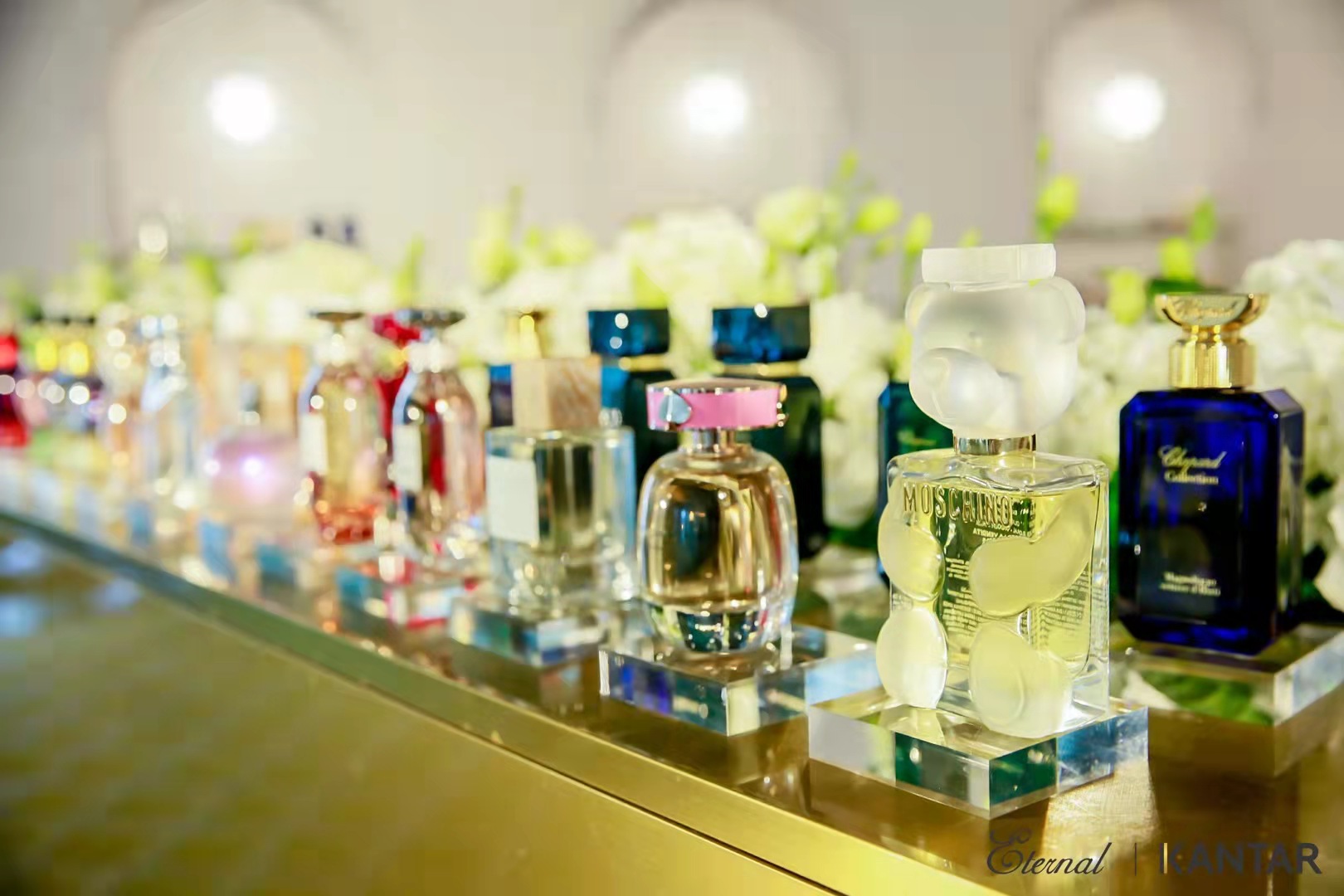- 2021-11-11
- 阅读量:3499
- 来源| Cosmetic Business Online
- 作者|Zhang HuiYuan
This may be the most "authoritative" trend interpretation on China's perfume industry in 2021.
Eternal now once again comprehensively combs through, researches and sets the tone for the Chinese perfume market after releasing the White Paper on the Research of the Perfume Industry in China 1.0 together with iResearch in 2020, which brought an interpretation on the perfume market and consumers for beauty industry insiders for the first time.

The white paper last year studied the basic characteristics of Chinese perfume consumers and the consumer behavior trends on the media side and experience side. The White Paper 2.0 this year focused more on Eternal's exploration in the Chinese perfume market, brand business practices, and consumers' needs.
Established in Hong Kong, China in 1980, Eternal entered the mainland market in 1989 and has been gloriously successful for 41 years. At the critical moment, looking forward at the next 40 years and facing a boom in the Chinese perfume market, Eternal has combed through and set the tone for the Chinese perfume market, reflecting i its stance as a leader in the perfume market.

01
China's Perfume Market Dramatically Changed
in the Past 40 Years
"Unattainable" Perfume in the Past
is Now “Used on Common Occasions”
Having been with Eternal for 22 years, Lin Jing, Senior Vice President of Eternal, has become the "walking dictionary" recording the changes in perfume consumption in the Chinese mainland, and has divided the consumption of Chinese perfumes since the 1980s to current time into five stages:

△Lin Jing, Senior Vice President of Eternal
First of all, in the 1980s when the reform and opening-up was slowly starting, the national average spending per person on clothing was only RMB 42, so perfume consumption seemed "unattainable". It was in the era of lack of imagination for "beauty" that Liu Jurong, the President of Eternal, entered the Chinese mainland market with his first perfume brand, French Salvador Dali, and with his forward-looking vision.
Ten years later, in the 1990s China’s per capita wage rose, and international brand perfumes such as Burberry, Dior and CHANEL entered the Chinese market one after another; around the 2000s perfume gifts became popular, and Sephora also entered China; around 2010, with the rise of e-commerce channels, consumers started the era of daily use of perfume, and their preferences gradually diversified.
Now, consumers in the current perfume market are more mature, have a sense of "pleasing oneself" with perfume, and even have the habit of stocking up on perfume. Meanwhile, there are increasingly diversified perfume channels and multi-dimensional content. Most importantly, new and original Chinese perfume brands have risen as national pride continues to increase.
More importantly, in the 40 years from the beginning to the boom of the Chinese modern perfume market, Eternal has always been with Chinese consumers. Eternal’s faith in beauty remained unshakable and has become even firmer as time has gone by.

Lin Jing once told the CBO reporter in an interview that in 1999 that Eternal’s business in Chinese mainland accounted for less than 10% of the entire group, but in 2020 it had exceeded 75% and was still increasing.
At present, Eternal maintains a market share of more than 20% in the Chinese market and has an absolute advantage in the domestic market.
02
China's Perfume Market Embraces a Golden Age
"Perfume Effect" Replace "Lipstick Effect"
The famous "lipstick effect" during the economic downturn has gradually been replaced by the "perfume effect" that more accurately summarizes the changes in consumption habits after the COVID-19 epidemic.
Under the epidemic, wearing a mask has become a semi-mandatory social requirement. To a certain extent, makeup loses its meaning. Perfume that will not be covered by masks has replaced lipsticks and become an important category for consumers to improve their sense of happiness.
Under this premise, the "Golden Age" is the tone set by Wang Wei, Vice President of Eternal China, for the current Chinese perfume market.

△Wang Wei, Vice President of Eternal China
Wang Wei revealed that according to Euromonitor's latest data, the compound annual growth rate of China's perfume market reached 14.9% from 2015 to 2020, and the growth rate in the next 5 years will be more optimistic and is expected to be 22.5%. By 2025, the retail sales of China's perfume market will reach RMB 30 billion. The compound growth rate of the global market in the next 5 years is about 7%. By comparison, in the next few years, the growth rate of the Chinese market will be about three times that of the global market, so the Chinese market has a huge potential for development and will be a key incremental market that international perfume brands need to make plans for in the future.
So what development characteristics does such a booming Chinese perfume market show?

03
The market share of high-end perfumes has jumped to 91%
Gender Neutral perfumes" or "women using men's perfumes" has become a fashion
According to White Paper 2.0, high-end perfumes are still a core segment driving the growth of China's perfume market and has occupied an increasing market share year by year, from 70% in 2015 to 91% in 2020.
Eternal also predicted that high-end products will remain the mainstream of the market for a long time to come, with high-end gender neutral perfumes being the segment with the highest compound annual growth rate.
Wang Wei explained that the "gender awareness" in societies changes, with "gender neutral perfumes" or "women using men's perfumes" becoming a fashion and one of the reasons for the high compound growth rate of high-end gender neutral perfumes, so this category is worth noticing in the future.
"Gender neutral perfumes have been growing over the past five years. Perfumes are no longer in a follow-the-fashion trend, but emphasize more on personalization. The user demand for perfumes has also divided the market into more segments. Each segment, regardless of 'China-chic' or international brands, popular perfumes or niche perfumes, has its own consumers. Perfumes are no longer monopolized by major brands," Northeast Asia Vice President of Symrise Yao Wenzhong agrees.

△ Northeast Asia Vice President of Symrise Yao Wenzhong
Coincidentally, Eternal has recently "hunted" a number of niche and literary perfumes, such as the famous British niche fragrance brand ATKINSONS, which dates back to the 13th century for the perfume line of the ancient Italian beauty brand Santa Maria Novella, and French niche and high-end Parfums de Marly inspired by French palace culture and arts in the 18th century. The Eternal group expects to introduce 10-12 brands in 2021, the largest number of brands introduced in a year in the group’s history.
The mass market performance is stable. The low-price strategy can be used to lower the threshold of the perfume category, further promote the consumption by inexperienced consumers or attract consumers of other categories to "enter" the market.

04
Department stores remain a core channel, while the market share of the e-commerce channel rises to 30%
Is there any difference among the perfume consumption on Taobao, JD and TikTok platforms?
The White Paper 2.0 shows that the perfume market is becoming more and more diversified, but department stores remain a core channel, which accounts for 55% of the overall business share. The share of the e-commerce channel for perfumes is getting higher, from 17% in 2015 to nearly 30% currently.
In the press conference, Lin Jing first made a comparative analysis of Taobao and JD platforms with large volumes and open data. In recent years, the distribution proportion of sales from JD and Taobao platforms in the perfume market has mainly been 2:8. The compound growth rate of the Taobao platform in the perfume industry is relatively high, with 7 points higher than that of JD platform. Therefore, we can see that the sales proportion of the Taobao platform has improved somewhat from 80% to 83% in the first half of 2021.
First of all, new brands are more suitable to enter the Taobao platform while international brands are suitable for the JD platform. Secondly, the two platforms both show the trend of offering high-end perfumes, and Taobao platform also needs to pay attention to the mid-market opportunities.

At the same time, the marketing pace of the two brand platforms also varies. The sales peak of Taobao platform is the Nov. 11 online shopping festival. JD perfume users purchase products around times of the gift seasons, or because the majority of users are male gift scene-driven perfume purchase demand is clearer
TikTok is the third rising e-commerce platform. According to the press conference, the number of people in the perfume vertical category on the TikTok platform has reached more than 80 million and once reached more than 100 million during the 818 promotion; Live streaming studios selling perfume-related products every day can generate sales between RMB 3 million and RMB 4 million, accounting for 15% of the beauty industry on TikTok.
Also, because perfume brands, especially international brands, hold the current wait-and-see attitude toward the layout of TikTok, domestic perfume brands are seizing the opportunity to grab the attention of the large number of perfume users on TikTok. The two domestic brands Boitown and Dear Boyfriend are among the Top 5 of the perfume industry on TikTok in terms of brand exposure. There are 5 domestic brands in the top 10 of the perfume industry on TikTok.
Li Xiaojie, Senior Research Director, Innovation & Customer Experience, Kantar China, also put forward his own observation on the development of the online perfume market. At present, Kantar has found that perfume information acquisition through multi-channel collaboration, such as perfume review, product introduction, use experience sharing and other in-depth content, has a higher impact on consumers. At the same time, contents, social platforms and short video clips/live streaming have great influence. In particular, live streaming KOLs are highly trusted.

△Li Xiaojie, Senior Research Director,
Innovation & Customer Experience, Kantar China
05
Capital helps emerging brands bloom
Oriental aesthetics and exclusive nostalgic memory stand out
"Be familiar with but do not look up to nternational commercial perfume brands; favor but do not blindly follow salon perfume brands; be tolerant of and willing to try domestic brands." Li Xiaojie believes that the current perfume consumers are more confident and mature, with more open consumer mentality, which has created a good development environment for all the perfume brands.
According to oIBP's statistics, the total market share of China's TOP 10 perfume brands is 42%, reflecting moderate market concentration and market opportunities. Noting this, domestic and foreign capital and beauty groups have been very active in the Chinese market within the latest three years.
Just four international cosmetics groups, namely L'Oreal, Shiseido, Estee Lauder and Puig, have introduced nine perfume brands to the Chinese market over the past three years.
At the same time, cutting-edge domestic perfume brands have also been hotly favored by the capital market and have seen intensive financing transactions. At the press conference, the White Paper 2.0 also shows some of the hot cutting-edge domestic brands on the market, such as To summer, Barrio, RE CLASSIFIED, Scent Library, and Scentooze.
The reason is that under the sudden increase in national self-confidence, the cutting-edge domestic perfume brands, with the revival of Chinese culture as the brands’ own responsibility, are blooming with their profound oriental aesthetics and ability to arouse the nostalgia of Chinese consumers.
Local perfume elements such as bamboo, plum flower and sweet osmanthus familiar to Chinese people, local culture such as ancient poetry, Dream of Red Mansions, Beijing Opera and Kun Opera, childhood nostalgic memories such as white rabbit milk candy, etc., more easily drive the moods and memories of Chinese consumers, and even attract non-perfume consumers and increase the possibility of purchasing.
With the release of the White Paper 2.0, some domestic brands rooted in Chinese culture have initially proved that Chinese perfume brands after abandoning low price strategy can still achieve commercial success.











